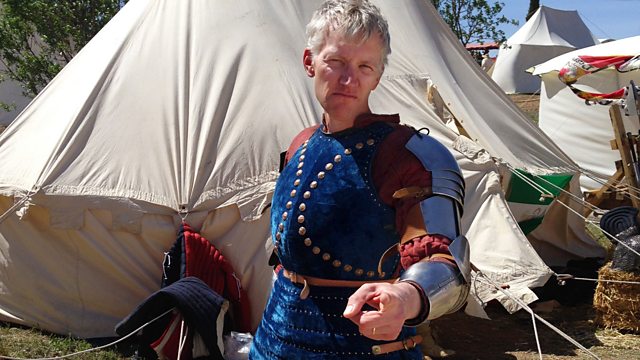
Cherbourg 1940 - Panomphaeus Cult - Old Welsh in Scotland
Vanessa Collingridge discovers when the Old Welsh language died out in Scotland.
Cherbourg 1940
A listener asks why there are graves in the village of Denneville near Cherbourg in France marking the deaths of eight British soldiers on the 17th June 1940 – nearly two weeks after the evacuation of Dunkirk. What were they doing there?
Making History consulted the Commonwealth War Graves Commission and the local Mayor and his Deputy in Denneville. Dunkirk wasn’t the end of British action on French soil. Thousands of men (some put the number as high as 200,000) remained fighting in pockets inland in a line stretching from Dunkirk in the east to Cherbourg in the west. Added to these were troops from the 1st Armoured Division under General Evans who had been sent to relieve the pressure on the forces stranded on Dunkirk beach; the 52nd Highland Division and the 51st Canadian Armoured Division. With the French army in disarray, the British sorting out the aftermath of Dunkirk, there was a made scramble to escape France and Rommel’s advancing German troops.
Making History tracked down the one survivor of the incident at Denneville at his home in Sheffield. Geoffrey Goodman was only 19 in 1940 and had one of his legs blown off. He regained consciousness in a Southampton hospital but, in recent years with the help of his family, has returned to the place where he lost his comrades. More information at: Normandy 1944/Dennville.
Panomphaeus Cult
A listener in Sheffield wants to know more about the cult referred to in a letter he found bricked up in a wall of his house. Making History consulted professor Ronald Hutton at the University of Bristol who explained the background to similar cults as part of a move against science and the rational – but he had never heard of the Panomphaeus Cult.
Old Welsh in Scotland
A listener in Wales (with a surname that shares his country’s name too) asked when the Old Welsh language died out in Scotland.
Making History consulted Professor Thomas Clancy at the University of Glasgow who explained that the language used in the fringe areas of Britain throughout the Roman and Saxon period and into the early middle ages was more akin to modern Welsh than the English we speak today.
Last on
Broadcast
- Tue 5 Jun 2007 15:00�鶹�� Radio 4
Podcast
-
![]()
Making History
Popular history series where the past connects with the present.

